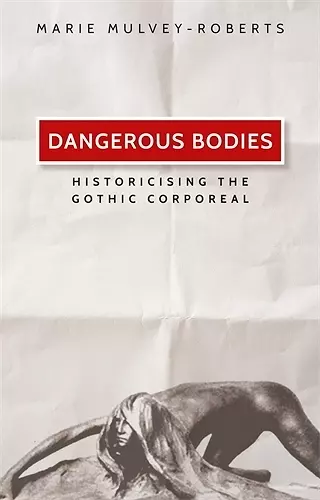Dangerous Bodies
Historicising the Gothic Corporeal
Format:Hardback
Publisher:Manchester University Press
Published:1st Jan '16
Currently unavailable, and unfortunately no date known when it will be back

Through an investigation of the body and its oppression by the church, the medical profession and the state, this book reveals the actual horrors lying beneath fictional horror in settings as diverse as the monastic community, slave plantation, operating theatre, Jewish ghetto and battlefield trench.
The book provides original readings of canonical Gothic literary and film texts including The Castle of Otranto, The Monk, Frankenstein, Dracula and Nosferatu. This collection of fictionalised dangerous bodies is traced back to the effects of the English Reformation, Spanish Inquisition, French Revolution, Caribbean slavery, Victorian medical malpractice, European anti-Semitism and finally warfare, ranging from the Crimean up to the Vietnam War. The endangered or dangerous body lies at the centre of the clash between victim and persecutor and has generated tales of terror and narratives of horror, which function to either salve, purge or dangerously perpetuate such oppositions. This ground-breaking book will be of interest to academics and students of Gothic studies, gender and film studies and especially to readers interested in the relationship between history and literature.
'Admirable! Now at last I know what "Gothic" means.'
Fay Weldon
'This book breaks new ground in Gothic studies by relating a series of enduring images of the body in torment to actual historical events and trends[...] A significant addition to the body of writing on the Gothic, the study of Gothic as writing on the body.'
David Punter, Professor of English, University of Bristol
‘Mulvey-Roberts has put together an excellent text that is soundly designed and structured, rigorously documented and supported through compact and learned endnotes, and includes cogently argued concepts, analyses, and interpretations. Dangerous Bodies: Historicising the Gothic Corporeal will, I hope, become a standard text for the field.’
Edmund Cueva, The Irish Journal of Gothic and Horror Studies 16 (Autumn 2017)
'… this study is a deeply historicized and thoroughly researched reading of several canonical Gothic texts and one film, spanning the period from the eighteenth to the twentieth century … The array of topics brought together here is dizzying … the past scholarship and new insights are brought together to create a seamless account of how the Gothic recounts, parallels, anticipates, and unfortunately sometimes encourages historical atrocity … Dangerous Bodies [is] a valuable and unflinching analysis that reaches beyond our current critical limits.'
Kasee Laster, University of North Georgia, Science Fiction Studies
‘The gothic imaginary foregrounds the body unlike any other imaginary. In her methodically researched and richly detailed work, Dangerous Bodies: Historicising the Gothic Corporeal, Marie Mulvey-Roberts confirms this truth. Corporal parts, the bloodied bits, scraps and orts of the human body, and Gothic’s preoccupation with
threading them often literally together, as in the case of Mary Shelley’s Frankenstein, are evaluated in Mulvey-Roberts’s text. The Gothic has always explored, exploited and revelled in the extremes of the body; it has always enjoyed the messy, monstrous and grotesque potential that the human form offers. Similarly, Mulvey-Roberts revels in the critical possibilities and scholarly opportunities that a study of gothic corporeality holds.’
Hannah Hutchings-Georgiou, University College London, British Society for Literature and Science
'This exceptionally well-argued volume breaks new ground in liking the representations of the monstrous body to the historical traumas that culture responds to, and neatly illuminates the dialectic relationship between the Gothic body of work and the work of the Gothic body.'
Gothic Studies
- Winner of Winner of the Alan Lloyd Smith Memorial Prize in 2017 2018 (UK)
ISBN: 9780719085413
Dimensions: 216mm x 138mm x 19mm
Weight: 499g
272 pages